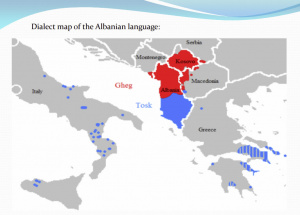Language/Tosk-albanian/Grammar/Adjectives
Hi Tosk Albanian learners! 😊
In this lesson, we will focus on Tosk Albanian adjectives.
What are adjectives?
Before we start with adjectives in Tosk Albanian, let's remind ourselves what adjectives are in general. Adjectives are words that describe or modify nouns or pronouns. They provide more details about a person, place, or thing. In English, adjectives usually come before the noun they modify, e.g., "the red ball". However, in Tosk Albanian, adjectives are generally placed after the noun, e.g., "topi i kuq" (the red ball).
Tosk Albanian Adjectives
In Tosk Albanian, adjectives do not change according to gender or number. They usually end in -ë, -a or -e, depending on the noun they modify. For example:
| Tosk Albanian | Pronunciation | English |
|---|---|---|
| makinë e re | "ma-ki-në e re" | new car |
| shtëpi e bukur | "shtë-pi e bu-kur" | beautiful house |
| libër interesant | "li-bër in-te-re-san-t" | interesting book |
| shok i mirë | "shok i mirë" | good friend |
As you can see, the adjective agrees with the noun in case and gender.
Exception to the rule
While most adjectives in Tosk Albanian follow the rule of ending in -ë, -a or -e, there is an exception. The adjective "i/e" (meaning "this" or "that") does not change form depending on the gender, number, or case of the noun it modifies. For example:
| Tosk Albanian | Pronunciation | English |
|---|---|---|
| kjo libër | "kjo li-bër" | this book (feminine) |
| ky libër | "ky li-bër" | this book (masculine) |
| këta libra | "kë-ta li-bra" | these books (masculine plural) |
| këtë libër | "kë-të li-bër" | this book (masculine accusative) |
Using Adjectives in Context
Let's see some examples of how adjectives can be used in context:
Dialogue:
- Person 1: "Si është jeta në qytet? (How is life in the city?)"
- Person 2: "Nuk është e lehtë, por është shumë interesante. (It's not easy, but it's very interesting.)"
Dialogue:
- Person 1: "A ke shikuar filmin e ri? (Have you watched the new movie?)"
- Person 2: "Po, ishte shumë i mrekullueshëm. (Yes, it was very wonderful.)"
Conclusion
In conclusion, we hope this lesson has helped you understand adjectives in Tosk Albanian better. Remember to practice and use them in context to improve your language skills. To improve your Tosk Albanian Grammar, you can also use the Polyglot Club website. Find native speakers and ask them any questions!
➡ If you have any questions, please ask them in the comments section below.
➡ Feel free to edit this wiki page if you think it can be improved. 😎
Related Lessons
- Nouns
- Gender
- Personal pronouns
- Conditional Mood
- Give your Opinion
- Questions
- How to Use Have
- Pronouns
- Future Tense

